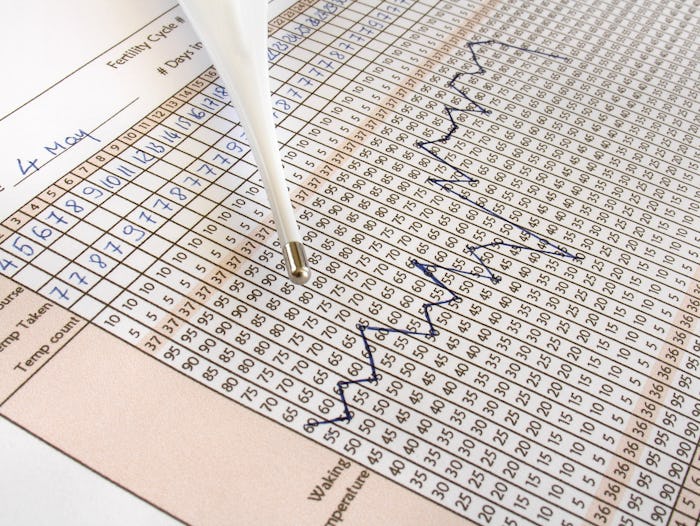Life

The Correlation Between Your Temperature & Ovulation
Every time I took my temperature when I was trying to conceive, I thought about Little Caesar's Hot-N-Ready Pizzas. Like, "Oh look, I'm at 99.1 degrees and ready for you, husband." I had no idea why I had to chart my temperature, only that I did while trying to get pregnant. Plenty of other hopeful moms-to-be do, too, but how does my temperature affect ovulation? It's actually pretty cool.
When I was growing up, some of the members of the religious community I grew up in were very anti-birth control. The reasons for this vary, and honestly, you do you, but most of my friends' moms had what is commonly referred to as "natural family planning" (NFP) down to a science. NFP is a way of charting your basal body temperature month-to-month to determine when you're likely to ovulate, according to the American Pregnancy Association, allowing you to skip out on a between the sheets sesh, and hopefully, also skip out on a positive pregnancy test.
By the time I was in high school, many girls were already thinking about getting married. Needless to say, NFP came up frequently, even if none of us really understood why or how it could work. How does it work, though? How does my temperature affect ovulation? While most of my friends now wholeheartedly embrace birth control, many of us track our temperatures when trying to conceive, and still don't know why. I mean, we know we're hot, but what gives?
It turns out that our bodies are pretty cool. According to the Mayo Clinic, your body is at the peak of fertility about two days before your temperature spikes, which is why it's so important to chart it for several months in order to predict when this spike will likely occur. The culprit of this spike is progesterone. According to the Journal of Applied Physiology, the progesterone elevation that occurs with ovulation also causes a corresponding elevation in waking, or basal, body temperature.
Our Bodies, Ourselves noted that this elevation continues for the remainder of your cycle that month, but if you're pregnant, your temperature will remain elevated for a period of around 18 days. Apparently, your body is "hot-n-ready" two days after you should be hot and ready, but with a little tracking and lot of organization, you can predict it. Or, you could just buy an ovulation kit. Whatever floats your boat. I love a color-coded organizer, so it works for me.
This article was originally published on